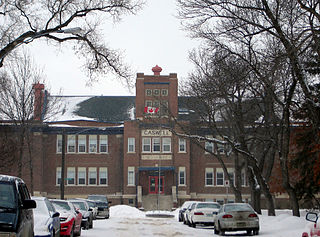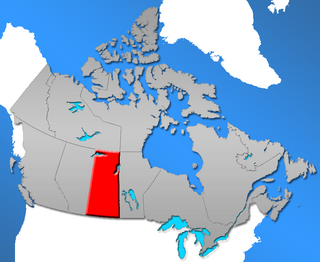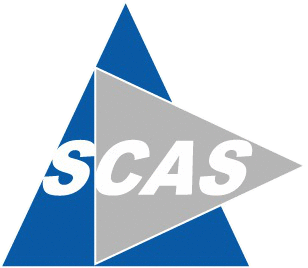
Weyburn is the tenth-largest city in Saskatchewan, Canada. The city has a population of 11,019. It is on the Souris River 110 kilometres (68 mi) southeast of the provincial capital of Regina and is 70 kilometres (43 mi) north from the North Dakota border in the United States. The name is reputedly a corruption of the Scottish "wee burn," referring to a small creek. The city is surrounded by the Rural Municipality of Weyburn No. 67.

The University of Saskatchewan is a Canadian public research university, founded on March 19, 1907, and located on the east side of the South Saskatchewan River in Saskatoon, Saskatchewan, Canada. An "Act to establish and incorporate a University for the Province of Saskatchewan" was passed by the provincial legislature in 1907. It established the provincial university on March 19, 1907 "for the purpose of providing facilities for higher education in all its branches and enabling all persons without regard to race, creed or religion to take the fullest advantage". The University of Saskatchewan is the largest education institution in the Canadian province of Saskatchewan. The University of Saskatchewan is one of Canada's top research universities and is a member of the U15 Group of Canadian Research Universities.

The University of Regina is a public university located in Regina, Saskatchewan, Canada. Founded in 1911 as a private denominational high school of the Methodist Church of Canada, it began an association with the University of Saskatchewan as a junior college in 1925, and was disaffiliated by the Church and fully ceded to the university in 1934; in 1961 it attained degree-granting status as the Regina Campus of the University of Saskatchewan. It became an autonomous university in 1974. The University of Regina has an enrolment of over 15,000 full and part-time students. The university's student newspaper, The Carillon, is a member of CUP.

Fitchburg State University is a public university in Fitchburg, Massachusetts. It has 3,421 undergraduate and 1,238 graduate/continuing education students, for a total student body enrollment of 4,659. The university offers undergraduate and graduate degrees in 25 academic disciplines. The main campus, the McKay Campus School, and athletic fields occupy 79 acres (320,000 m2) in the city of Fitchburg; the biological study fields occupy 120 acres (490,000 m2) in the neighboring towns of Lancaster, Leominster, and Lunenburg.

Regina Transit is the public transportation agency operated by the City of Regina, Saskatchewan, Canada. It is the oldest public transit system in Saskatchewan and has been city-owned since its inception.

Winston Churchill Collegiate Institute is a public high school in Toronto, Ontario, Canada. Located in the Dorset Park neighbourhood of Scarborough, it is owned and operated by the Toronto District School Board The school was named after Winston Churchill, the Prime Minister of the United Kingdom from 1940 to 1945 and 1951 to 1955.

R. H. King Academy, formerly known as Scarborough High School, Scarborough Collegiate Institute and R.H. King Collegiate Institute is a secondary school and a de facto alternative school located in Scarborough, Toronto, Ontario, part of the Toronto District School Board. The school was established in 1922, then became a collegiate in 1930, renamed in 1954 and again in 1989. This school was named after Reginald Harold King, a Canadian educator and classicist.

Midland Avenue Collegiate Institute, formerly Midland Avenue Secondary School and initially known as Central Collegiate Institute is a Toronto District School Board-owned alternative learning complex in Toronto, Ontario, Canada. Located in the former suburb of Scarborough, it consists of Scarborough Centre for Alternative Studies (SCAS), South East Year Round Alternative Centre (SEYRAC), and Caring and Safe Schools Midland program.

Centennial Collegiate is a secondary school located on Nelson Road in Saskatoon, Saskatchewan, Canada. Approximately 1,500 students were enrolled, as of 2024. Centennial has a partnership with SaskTel Soccer Centre, making it a shared-use facility.

Education in Saskatchewan, Canada, teaches a curriculum of learning set out by the Government of Saskatchewan through the Ministry of Education. The curriculum sets out to develop skills, knowledge and understanding to improve the quality of life. On June 22, 1915, Hon. Walter Scott, Premier and Minister of Education, set out as his mandate the "purpose of procuring for the children of Saskatchewan a better education and an education of greater service and utility to meet the conditions of the chief industry in the Province, which is agriculture". Education facilitates the cultural and regional socialization of an individual through the realisation of their self-potential and latent talents. Historically, the region of Saskatchewan needed successful homesteaders so the focus was to develop a unified language for successful economic trading, and agricultural understanding to develop goods, livestock and cash crops to trade. After the mechanized advancements following the Industrial Revolution and World War II, the primary employment agriculture sector of farming was not as labour-intensive. Individuals focused on secondary industries such as manufacturing and construction, as well as tertiary employment like transportation, trade, finance and services. Schools became technologically more advanced and adapted to supply resources for this growing demand and change of focus.

University of Saskatchewan has over 200 academic programs on its Saskatoon, Saskatchewan campus, and is internationally known for its teaching and research. The on-campus synchrotron Canadian Light Source makes it the only Canadian institution for such nuclear and biotechnology research. Canadian Light Source nuclear research facility provides research and analysis of the internal structures of advanced materials and biological samples. The College of Arts and Science is the largest of the U of S and comprises five separate health science fields in addition to numerous other programs in the Arts, Social Sciences, Humanities, and Natural Sciences. The Department of Computer Science as well as the College of Engineering are ranked highly within their fields. The founding college, the College of Agriculture, is still providing agricultural breakthroughs which are utilized worldwide.

Historically, Saskatchewan's higher education system has been "significantly shaped" by demographics. In 1901, six years prior to the 1907 founding of a university in Saskatchewan, the urban population in Saskatchewan was 14,266 (16%) while the rural population was 77,013 (84%). One hundred years later, the proportions had changed significantly: urban population in 2001 was 629,036 (64%) while the rural population was 349,897 (36%). Over time the province's higher education system has changed significantly in response both to this demographic shift and to provincial politics.

Scott Collegiate is a public high school located in the North Central neighbourhood of Regina, Saskatchewan, Canada. Operated by Regina Public Schools, it is named for Walter Scott, the first premier of Saskatchewan. It is an officially designated community school.

W. A. Porter Collegiate Institute is a secondary school in Toronto, Ontario, Canada. It is located in the Clairlea neighbourhood of the former suburb of Scarborough. The school provides grades 9-12 as part of the Toronto District School Board, formerly part of the Scarborough Board of Education.

The Scarborough Board of Education, formally the Board of Education for the City of Scarborough is the former public-secular school district serving Scarborough, Ontario, Canada. The board was founded in 1954 through a merger of the Scarborough Collegiate and Township School Boards.

Warren Steinley is a Canadian politician, who was elected Member of Parliament for the riding of Regina—Lewvan in the 2019 Canadian federal election. He represents the riding of Regina—Lewvan in the House of Commons as a Member of the Conservative Party.

Scarborough Centre for Alternative Studies (SCAS), formerly Tabor Park Vocational School is an alternative and adult high school serving Scarborough, a part of Toronto, Ontario, Canada. It operates under the Toronto District School Board and was previously part of the pre-amalgamated board, Scarborough Board of Education prior to merger. Originated at Birchmount Park Collegiate Institute in 1977 as the re-entry program, the school opened in 1986 at the Tabor Park building and as of 2010, the school is located in the campus of the former Midland Avenue Collegiate Institute sharing with the fellow schools, South East Year Round Alternative Centre and Caring and Safe Schools Alternative Program Area C. SCAS is located on Midland Avenue south of Eglinton Avenue East.
Foxborough Public Schools is the public school district serving Foxborough, in Norfolk County, Massachusetts. As of October 2018 it enrolled 2590 students.
Regina School Division #4, also known as Regina Public Schools (RPS), is the Anglophone secular public school district of Regina, Saskatchewan, Canada. Its headquarters, J.A. Burnett Education Centre, was named after teacher Jim Burnett.


















